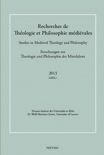
Recherches de Theologie et Philosophie Medievales
Scope & Guideline
Advancing Scholarship in Medieval Theology and Philosophy
Introduction
Aims and Scopes
- Medieval Philosophy and Theology:
The journal focuses on the exploration of philosophical and theological ideas developed during the medieval period, examining key figures, texts, and traditions. - Textual Criticism and Editions:
It emphasizes the importance of critical editions and commentaries of medieval texts, providing scholars with access to original works and new interpretations. - Interdisciplinary Approaches:
The journal encourages interdisciplinary research that connects philosophy, theology, history, and literature, reflecting the complex nature of medieval scholarship. - Historical Contextualization:
There is a consistent focus on situating medieval thought within its historical context, analyzing how social, political, and cultural factors influenced philosophical and theological developments. - Comparative Studies:
The journal includes comparative analyses between different medieval thinkers and traditions, highlighting dialogues between various schools of thought.
Trending and Emerging
- Comparative Philosophy:
There is a noticeable increase in comparative studies, particularly between different philosophical traditions such as Arabic and Latin philosophies, reflecting a growing interest in cross-cultural intellectual exchanges. - Epistemology and Psychology of Faith:
Recent works have increasingly focused on the epistemological and psychological dimensions of faith within scholastic thought, indicating a trend towards understanding the cognitive aspects of medieval belief systems. - Mathematics and Philosophy:
The relationship between mathematics and philosophical inquiry is gaining attention, as evidenced by studies comparing medieval mathematical thought with philosophical frameworks, highlighting the integration of these disciplines. - Critical Reassessments of Key Figures:
There is a trend towards critical reassessments of influential medieval thinkers like Peter Lombard and Thomas Aquinas, suggesting a renewed interest in revisiting and reinterpreting established narratives in medieval philosophy. - Theological Implications of Free Will:
Themes surrounding free will, particularly in the context of angelology and divine predestination, are emerging as significant areas of inquiry, reflecting ongoing debates about autonomy and divine influence in medieval thought.
Declining or Waning
- Early Christian Predecessors:
Discussions specifically focused on early Christian thinkers as precursors to medieval philosophy have become less frequent, suggesting a reduced interest in tracing direct influences from early Christianity. - Astrology and Celestial Influence:
Themes related to astrology and the influence of celestial bodies on theological thought are appearing less frequently, indicating a potential waning interest in these topics in contemporary scholarship. - Pedagogical Studies in Medieval Contexts:
Research exploring the pedagogical methods and educational practices of the medieval period is declining, possibly due to a broader focus on theoretical rather than practical aspects of medieval thought.
Similar Journals

VIVARIUM-AN INTERNATIONAL JOURNAL FOR THE PHILOSOPHY AND INTELLECTUAL LIFE OF THE MIDDLE AGES AND RENAISSANCE
Bridging Eras: Unraveling the Philosophical Tapestry of HistoryVIVARIUM - AN INTERNATIONAL JOURNAL FOR THE PHILOSOPHY AND INTELLECTUAL LIFE OF THE MIDDLE AGES AND RENAISSANCE is a distinguished academic journal published by BRILL. Established in the Netherlands, this journal serves as a crucial platform for scholars and researchers interested in exploring the multifaceted intellectual currents that shaped the Middle Ages and Renaissance. With a commendable Q2 ranking in both History and Philosophy categories, VIVARIUM holds an esteemed place in the academic community, reflecting its significant contribution to these fields. The journal covers a broad temporal scope, accommodating research published from 1963 to the present, ensuring a rich archival resource for comparative and historical analysis. Despite being a non-open access periodical, its well-circulated articles are essential readings for students and professionals alike, aiming to deepen the understanding of philosophical thought and its implications across eras. As the study of these historic periods continues to resonate in contemporary discourse, VIVARIUM stands as a beacon for intellectual engagement and scholarly dialogue.
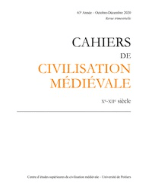
CAHIERS DE CIVILISATION MEDIEVALE
Connecting Scholars Through Medieval DiscourseCAHIERS DE CIVILISATION MEDIEVALE is a distinguished scholarly journal focusing on the multifaceted aspects of medieval civilization, including its history, literature, visual arts, and performing arts. Published by the CENTRE ETUD SUPERIEUR CIV MED in France, this journal serves as a vital resource for researchers, professionals, and students striving to deepen their understanding of the medieval period. Although the journal’s impact factor and HIndex are not explicitly listed, it has been categorized in Q4 for 2023 in key areas such as History and Literature, indicating its role within niche academic discussions. With content spanning converged publication years from 2002 to 2014 and 2017 to 2023, CAHIERS DE CIVILISATION MEDIEVALE aims to foster a rich dialogue among scholars in the field, while its accessibility options provide a pathway for the dissemination of knowledge. Dive into the intricate world of medieval studies through this essential publication, which seeks to elevate the discourse and provide a platform for innovative research.
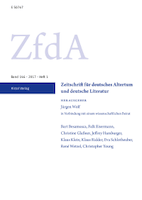
ZEITSCHRIFT FUR DEUTSCHES ALTERTUM UND DEUTSCHE LITERATUR
Advancing Knowledge in German Literature and LinguisticsZeitschrift für deutsches Altertum und deutsche Literatur is a pivotal academic journal dedicated to the exploration and analysis of German-language antiquity and literature. Published by S Hirzel Verlag, this esteemed journal is based in Germany and has been contributing to the fields of Linguistics, Language, and Literary Theory since its inception. With a history spanning from 1979 to the present, the journal showcases rigorous research and critical studies that enhance our understanding of both historical and contemporary literary landscapes. Although currently not an open-access publication, Zeitschrift für deutsches Altertum und deutsche Literatur operates within the Q4 quartile in its respective categories, reflecting a unique niche within the academic community. As a valuable resource for researchers, professionals, and students alike, it fosters a deeper appreciation for the intricacies of German literature and its evolution, serving as an essential platform for scholarly discourse.
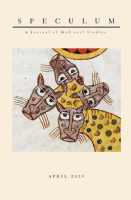
SPECULUM-A JOURNAL OF MEDIEVAL STUDIES
Unveiling the Rich Tapestry of the Middle AgesSPECULUM: A Journal of Medieval Studies, published by University of Chicago Press, stands as a premier academic platform within the field of medieval studies. With an impressive legacy dating back to its inception in 1926, this journal has attracted scholarly contributions that explore the rich tapestry of human experience during the medieval period, encompassing areas such as history, literature, philosophy, cultural studies, and the visual and performing arts. It boasts elite rankings—Q1 in History, Literature and Literary Theory, Religious Studies, and Visual Arts and Performing Arts, with a commendable Q2 in Cultural Studies and Philosophy—attesting to its impact and relevance in academia. Although it is not an open-access journal, the rigorous peer-review process and critical scholarship found within its pages provide invaluable insights for researchers, professionals, and students alike. With a substantial Scopus ranking, ID 0038-7134, and E-ISSN 2040-8072, SPECULUM continues to serve as an essential resource for advancing knowledge and understanding of the medieval world, encouraging interdisciplinary dialogue and scholarly interaction.
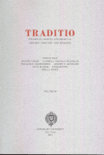
TRADITIO-STUDIES IN ANCIENT AND MEDIEVAL HISTORY THOUGHT AND RELIGION
Bridging Eras: Insights into Ancient and Medieval WisdomTRADITIO - Studies in Ancient and Medieval History, Thought and Religion is a distinguished academic journal published by Cambridge University Press, dedicated to the exploration and analysis of historical, philosophical, and religious narratives from ancient and medieval periods. The journal's ISSN is 0362-1529 and its E-ISSN is 2166-5508. Renowned for its rigorous scholarship, it enjoys a notable standing in the academic community, reflected in its 2023 category quartiles which place it in the second and third tiers across critical fields such as Literature and Literary Theory, Philosophy, Religious Studies, and Visual Arts and Performing Arts. With its comprehensive scope that encompasses multidisciplinary approaches, TRADITIO provides an essential platform for researchers, academics, and students alike to engage deeply with the complexities of historical thought and cultural practices. Although the journal operates within the traditional subscription model, its significance is underscored by impressive Scopus rankings, indicating its high visibility and impact within the arts and humanities sectors. We invite you to discover the richness of ancient and medieval studies through the pages of TRADITIO.

Revista Chilena de Estudios Medievales
Bridging Eras: Where Medieval Studies Meet Modern InquiryRevista Chilena de Estudios Medievales, published by Universidad Gabriela Mistral, is a premier open access journal that has been serving the field of medieval studies since 2012. With its unique ISSN 0719-2215 and E-ISSN 0719-689X, this journal provides a vital platform for scholars, researchers, and students interested in the rich tapestry of medieval history, literature, and culture. Located in Santiago, Chile, at Ladislao Errazuriz 2073, Providencia, Santiago 00000, the journal aims to foster a deeper understanding of the medieval period through interdisciplinary research and insightful articles. While impact factors and HIndex data are currently unavailable, the journal is dedicated to maintaining high academic standards and promoting knowledge dissemination in the field. Its open access model ensures that research is freely available to the global community, thereby enhancing engagement and collaboration among medieval studies scholars. Join us in exploring the depths of the medieval world through Revista Chilena de Estudios Medievales.

CAMBRIAN MEDIEVAL CELTIC STUDIES
Exploring the Heart of Medieval Celtic HeritageCambrian Medieval Celtic Studies is a distinguished academic journal dedicated to the exploration and analysis of the rich cultural, historical, and linguistic heritage of the Celtic regions during the medieval period. Published by the Department of Welsh at the University of Aberystwyth in the United Kingdom, this journal serves as a vital platform for scholars and researchers in the fields of archaeology, history, linguistics, and literary studies. With its ISSN 1353-0089, the journal has been operational since 2002, delivering valuable insights and fostering scholarly discourse up to the present, with plans for future publications extending to 2024. Although currently categorized in the Q4 quartile across various relevant fields, Cambrian Medieval Celtic Studies remains committed to enhancing the understanding of medieval Celtic culture through rigorous research and peer-reviewed content. Researchers and students alike will find this journal an essential resource for advancing their studies in these dynamic fields, as it provides open access to a wealth of interdisciplinary perspectives in the arts and humanities.

Reti Medievali Rivista
Advancing Scholarship in the Medieval EraReti Medievali Rivista, published by FIRENZE UNIV PRESS, stands as a distinguished platform in the field of history, specifically focusing on the medieval period. With an ISSN of 1593-2214, this journal has embraced Open Access since 2000, ensuring that its scholarly content is readily available to researchers, students, and professionals worldwide. Based in Italy, the journal boasts a Q2 ranking in the Category of History according to the 2023 quartiles, reflecting its significant impact and contribution to the discipline. With a Scopus rank of #809 out of 1760 in the Arts and Humanities category, it sits comfortably within the 53rd percentile, affirming its quality and relevance in the academic community. The journal's scope encompasses a wide range of topics related to medieval studies, making it an invaluable resource for those seeking in-depth research and analysis in this pivotal era of history. Scholars are encouraged to explore its diverse articles and insights, further enriching the dialogue surrounding medieval scholarship.
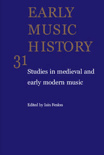
EARLY MUSIC HISTORY
Delving into the Depths of Early MusicEARLY MUSIC HISTORY is an esteemed academic journal published by Cambridge University Press, specializing in the rich and diverse field of early music, providing a vital platform for research and discourse since its inception. With an ISSN of 0261-1279 and an E-ISSN of 1474-0559, the journal operates from its headquarters in Cambridge, United Kingdom. Known for its scholarly rigor, EARLY MUSIC HISTORY is ranked within the Q2 category in Music, illustrating its significant contribution to the field. The journal covers a broad time frame, examining musical developments from the medieval to the early modern period, and features articles that seek to illuminate historical contexts and contemporary implications of early music practices. Despite lacking the Open Access option, it remains a valued resource for researchers and professionals seeking to advance their understanding of this dynamic area of study. The journal not only fosters a deeper appreciation of early music history but also positions itself as a pivotal contributor to ongoing academic dialogue, making it essential reading for scholars in the arts and humanities.

De Medio Aevo
Fostering Interdisciplinary Dialogue Across CulturesDe Medio Aevo is a distinguished academic journal published by UNIV COMPLUTENSE MADRID, SERVICIO PUBLICACIONES, dedicated to enriching the fields of Cultural Studies, History, Literature and Literary Theory, Philosophy, Religious Studies, and Visual Arts and Performing Arts. Since its inception in 2012 as an Open Access platform, this Spanish journal has rapidly established its reputation, achieving impressive rankings in various categories with a Q1 classification in Literature and Literary Theory and notable positions in Q2 across other fields as per the 2023 metrics. With an emphasis on rigorous scholarly research, De Medio Aevo seeks to foster the exchange of ideas and insights that reflect the rich tapestry of medieval studies and its ongoing impact on contemporary society. It is an essential resource for researchers, professionals, and students alike, encouraging interdisciplinary dialogue and exploration of the cultural narratives that shape our understanding of history and the arts. Located in Madrid, Spain, the journal is committed to making significant contributions to its fields, with a global reach and a focus on academic excellence.